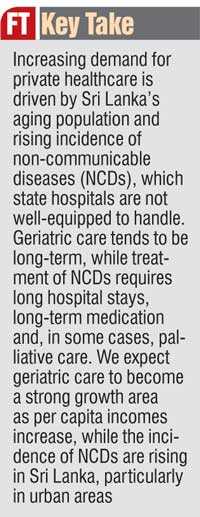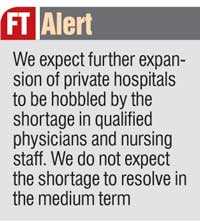Thursday Feb 19, 2026
Thursday Feb 19, 2026
Monday, 28 May 2018 00:00 - - {{hitsCtrl.values.hits}}

Fitch Rating is forecasting strong growth trajectory to continue for listed Sri Lankan hospitals despite resource constraints.
In a special report on listed hospitals, Fitch said it expects the balance sheets of Sri Lanka’s listed hospitals to improve in the medium term as their capex moderates and operating performances improve.
Most private operators expanded capacity in the last few years to meet growing demand. As a result, the combined net debt-to-EBITDA of the four largest listed hospitals rose to 2.6x at end-December 2017 from 1.7x at end-March 2013.
“However, we believe most hospitals will now focus on stabilising operations and strengthening balance sheets before funding further expansion,” Fitch said.
It expects the EBITDA margin of the listed hospitals to improve modestly in the medium term as patient volume increases. Higher occupancy at hospitals and larger revenue contributions from high-margin value-added businesses, such as diagnostics and laboratory services, should help to more than cover the high fixed costs of the sector and widen margins. “We also believe hospitals should be able to pass on cost increases from staff-related costs or currency depreciation to end-customers amid strong demand for private healthcare,” it said.

However, regulatory pressure from increased taxes on healthcare and recently introduced price controls on certain procedures may limit sector profitability in the near term. The listed hospitals’ EBITDA margin averaged around 23% in the last five years. Asiri Hospitals Holdings PLC, the largest listed operator in the country in terms of revenue and number of beds, was able to maintain better margins than peers due to its strong laboratory revenues. “We believe the increasing demand for private healthcare is driven by Sri Lanka’s aging population and rising incidence of non-communicable diseases (NCDs), which state hospitals are not well-equipped to handle. Geriatric care tends to be long-term, while treatment of NCDs requires long hospital stays, long-term medication and, in some cases, palliative care,” Fitch said.
“We expect geriatric care to become a strong growth area as per capita incomes increase, while the incidence of NCDs are rising in Sri Lanka, particularly in urban areas,” it added.
Fitch also said the demand for private healthcare in Sri Lanka is likely to improve in the medium to long term with wider acceptance of medical insurance, helped by government-led insurance schemes and increasing personal income.
“We expect further expansion of private hospitals to be hobbled by the shortage in qualified physicians and nursing staff. We do not expect the shortage to resolve in the medium term,” Fitch said.
